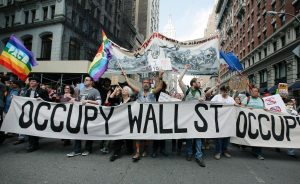
Has the internet age enabled social movements to become more influential?
by Rachel Pound
The Global Justice Movement rose out of the 1990s but the internet has really helped movements in the 21st Century become much more influential than those in the past. For instance, look at how much the Black Lives Matter movement has spread across social media, gaining mass support as a result. Sociologist, Manuel Castells argues that these Global Justice Movements have been enabled by mass networks of self-communication, which are characteristic of Information Age societies. Not only do these movements thrive because of the internet, they also mirror the structure of it: a decentralised, loose-knit network structure with no one person of authority or control. Mass communication as a result of the internet has allowed Global Justice Movements to become hugely popular not just within a community but all over the world. The internet age has also enabled protest to become much more of a threat to the withstanding structure of society than ever before.
Castells believes that it is imperative to study the role of the internet when looking at social movements. He said “it is essential to emphasize the critical role of communication in the formation and practice of social movements, now and in history … the connectivity depends on interactive networks of communication. And the fundamental form of large scale, horizontal communication in our society is based on the Internet and wireless networks” (Castells, 2012, p. 229). When thinking about recent social movements such as Black Lives Matter, it is clear how useful the internet has been at spreading the message of the movement. For many, it is an easier platform to carry out their activism as they may not physically be able to. “[The internet] protects the movement against the repression of their liberated physical spaces by maintaining communication among the people within the movement and with society at large in the long march of social change that is required to overcome institutionalised domination” (Castells, 2012, p. 229). The internet allows those who may not have access to information in their physical space to find it online, giving them the ability to become more educated and autonomous. “The internet provides the organisational communication platform to translate the culture of freedom into the practice of autonomy” (Castells, 2012, p. 231). An example of how the internet helped a social movement make a massive impact on society was Occupy 2011.
Occ upy was a social movement against austerity measures, greed of bankers, and inequality in general. It began with a social protest in the real world in 2011, Occupy Wall Street. The events spurred a worldwide reaction against economic inequality. The main slogan was “we are the 99%”, referring to the distinct gap between the top 1% of the wealthiest people in the US and the rest of the population. Occupy’s method of
upy was a social movement against austerity measures, greed of bankers, and inequality in general. It began with a social protest in the real world in 2011, Occupy Wall Street. The events spurred a worldwide reaction against economic inequality. The main slogan was “we are the 99%”, referring to the distinct gap between the top 1% of the wealthiest people in the US and the rest of the population. Occupy’s method of
protest was different from previous protests because it did not have a set end goal, but kept highlighting what was wrong with the current capitalist system instead. The way Occupy came up with goals was through a General Assembly, rather than having one main leader running the movement, this was a way to show the public that there was another way to lead a system that was successful. Despite the movement having a large physical manifestation, the internet allowed Occupy to become significantly more effective than it would have been had the internet not been available. Castells thought that Occupy’s virtual existence was the key to its success. Social media such as Twitter and Tumblr were vital websites which shared information about the movement all around the world. The mass communication allowed multiple voices and personal stories to be heard,
showing a real attempt at democracy. View example of Occupy’s influence online..
A more recent social movement is the Black Lives Matter movement. The internet has enabled this to become a worldwide virtual and social phenomenon. To show just how much of an impact the internet has on social movements, I searched the hashtag #blacklivesmatter into tweetreach.com. I found that in the past 100 tweets containing #blacklivesmatter it reached 245,358 accounts on twitter worldwide. In just 19 minutes. Imagine the number if it looked at how many tweets in total included the hashtag. This social movement started online initially as a response to police brutality, racial profiling and racial inequality within the American criminal justice system. It has gone on to have a big standing in the physical world as well, however, without the internet, it would be almost unheard of in comparison.
Another example of how the internet helps social movements spread is the Women’s March on 21 January 2017. This movement used its website and Twitter to spread the infor mation and gain recognition that there would be a march in Washington. This then led to consequent marches all over the world, in support. Again, I entered the hashtag #womensmarch to tweetreach.com and I found that the hashtag reached approximately 300,000 accounts in the past 100 tweets. This impact is reflected again in the real world: it is estimated that around 3.3 million people took part in the marches throughout most of the states in the US. Google trends showed that searches related to the women’s march increased by 100% from the end of December compared to the two weeks prior to the event. As twitter and social media in general were huge platforms for the march to be publicised it shows just how the internet age has influenced social movements.
mation and gain recognition that there would be a march in Washington. This then led to consequent marches all over the world, in support. Again, I entered the hashtag #womensmarch to tweetreach.com and I found that the hashtag reached approximately 300,000 accounts in the past 100 tweets. This impact is reflected again in the real world: it is estimated that around 3.3 million people took part in the marches throughout most of the states in the US. Google trends showed that searches related to the women’s march increased by 100% from the end of December compared to the two weeks prior to the event. As twitter and social media in general were huge platforms for the march to be publicised it shows just how the internet age has influenced social movements.
So, this must show how the internet has enabled social movements to become more influential. Castells argues that the internet and mass communications not only enable new forms of power in a ‘network society’, but also provides new forms of counter-power which are a way to resist the social injustice of the current system. But, despite the influence of the internet, do you think these movements will have real life altering impacts on society?
References
Castells, M. (2012). Changing the World in the Network Society. In M. Castells, Networks of Outrage and Hope: Social Movements in the Internet Age (pp. 218-244). Cambridge: Polity Press.

0 Comments